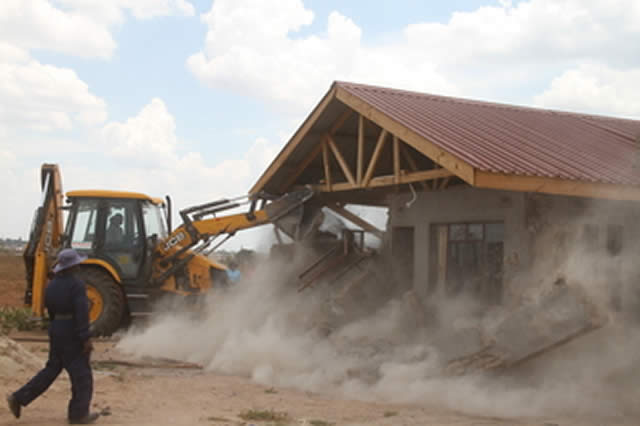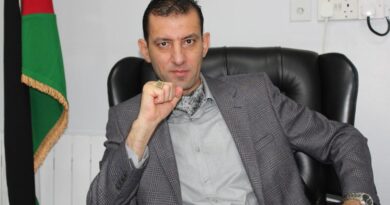Bulldozed dreams: When Sabhuku land deals turn sour
A CLOUD of dust hangs heavy over the shattered dreams of dozens of families in Mushandike, Masvingo province, as their homes, built with years of sweat and sacrifice, are reduced to rubble by government bulldozers — the cruel punchline to a land deal gone wrong.
Orchestrated by the local village heads, known as sabhukus, these deals promised a path to home ownership, but instead delivered a brutal eviction notice.
“It’s like a thief in the night stole everything,” said Esther Mativenga, her voice trembling as she clutched a photo album salvaged from the wreckage.
“This was not just a house; it was our future. We poured everything we had into it, believing sabhuku’s word.”
Mativenga’s story is etched on the tear-stained faces of countless others who now stand amid the ruins of their lives.
John Mbava, a carpenter, who had just finished building his family’s dream home, stares blankly at the skeletal remains.
“They took away more than bricks and mortar. They took away our hope,” he rasped, his voice thick with despair.
The government claims these demolitions were necessary, reclaiming land earmarked for public projects or deemed environmentally sensitive.
But residents scoff at this explanation.
“They knew what they were doing,” accused Margaret Chigwedere, her eyes flashing with anger. “They turned a blind eye while we built, only to demolish it all when it suited them.”
The anger simmers, laced with a bitter taste of betrayal. Trust in the sabhukus, once revered figures, lies shattered.
Fingers point, accusations fly, and the air crackles with the tension of unaddressed grievances.
Amid the despair, embers of defiance flicker. Community leaders are mobilising, demanding accountability and compensation.
Legal challenges are being mounted, seeking justice for the wronged families. The fight for their homes, and their dignity, has just begun.
But the scars run deep.
Children, robbed of their bedrooms and their routines, cling to their parents, their eyes wide with confusion and fear.
The elderly, their havens destroyed, face an uncertain future. The human cost of this bureaucratic blunder is etched in the lines of worry etched on their faces.
The Lands, Agriculture, Fisheries, Water and Rural Development ministry issued a stern warning to traditional leaders, particularly village heads, against selling State land.
“Several village heads have already been convicted of this crime,” said Obert Jiri, the ministry’s permanent secretary.
He emphasised that traditional leaders have no authority to sell State land, including communal land which is considered State land held in trust.
“Village heads should not sell land. It’s meant to be preserved for families within their areas. Protect it for your children. There’s no room for selling it to outsiders. This land belongs to future generations.”
The Constitution (Section 282) assigns traditional leaders the responsibility to manage communal land and protect the environment.
The Communal Lands Act further clarifies that rural land belongs to the President and can only be occupied and used in accordance with the Act.
Despite these regulations, some traditional leaders allegedly choose to ignore them for personal gain.
Jotamu Ruwona from Seke, a victim of such practices, shared his experience.
“I was asked to pay US$2 500 to US$3 000 per hectare by a village head,” he recounted.
“The money was to be shared among the district administrator, lands officer and village head. They promised to backdate the paperwork to hide the illegal transaction.”
The rising cost of urban land has pushed many homeseekers towards surrounding rural areas, putting pressure on local resources and social services.
Areas like Domboshava and Goromonzi, located within commuting distance of Harare, have become popular choices for these individuals.
Two Nyamandlovu village heads last week appeared before Bulawayo magistrate Maxwell Ncube facing a charge of unlawfully allocating 38 stands to homeseekers.
Chikombingo Moses Nyamande (84) and village development committee member Danisa Nyathi (59) were not asked to plead before being remanded to March 21 for trial.
Nyathi and Nyamande are resettled farmers on gazetted State land.
According to court papers, from January 21 last year, Nyamande and Nyathi allegedly allocated stands to 38 villagers without State authority. The villagers moved onto the land and constructed structures.
On January 22, police received a tip-off that the duo was illegally parcelling out State land and visited the area where they discovered that 38 illegal settlers had already built housing structures.
The accused failed to produce documentation authorising the settlers to occupy the land in question leading to their arrest.
Police in Matabeleland North province recently arrested 155 land barons and illegal settlers in Umguza, Bubi, Lupane and Hwange.




